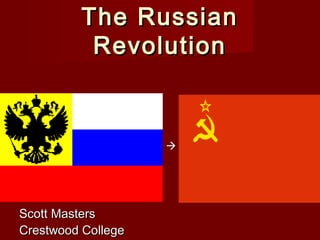
The russian revolution
- 1. The Russian Revolution Scott Masters Crestwood College
- 2. Pre-Revolutionary Russia Only true autocracy left in Europe No type of representative political institutions Nicholas II became tsar in 1884 Believed he was the absolute ruler anointed by God Russo-Japanese War (1904) – defeat led to pol. instability
- 3. conditions deteriorated, rev. became possible, esp. w/ Lenin’s involvement he had gravitated towards the Social Dem. Workers’ Party of George Plekhanov – they believed in dialectical materialism and thus favoured modernization/capitalism (which the czars also favoured as a measure to catch up w/ the w. Europe, esp. after the Crimean and Russo-Japanese Wars)
- 4. The Revolution of 1905 Rapid growth of (discontented) working class Vast majority of workers concentrated in St. Petersburg and Moscow Little help from the countryside: impoverished peasants – Populist Movements of the 1870s and later had done little to improve their lot – No individual land ownership – Rural Famine
- 5. Tsar paid no Conservatism attention to the Continues: Duma; it was harassed and 1905-1917 political parties suppressed – only token land reform was passed Nicholas was personally a very weak man; he became increasingly remote as a ruler Numerous soviets thus began to appear
- 6. Alexandra: The Power Behind the Throne Even more blindly committed to autocracy than her husband She was under the influence of Rasputin Origins of Rasputin’s power - ? Scandals surrounding Rasputin served to discredit the monarchy
- 7. Alexis: Alexandra’s Son with Hemophilia
- 8. World War I: “The Last Straw” War revealed the ineptitude and arrogance of the country’s aristocratic elite Corrupt military leadership had contempt for ordinary Russian people Average peasants had very little invested in the War
- 9. World War I (cont) ill-trained, ineffective officers, poorly equipped (Russ. was not ready for ind. war) – the result was mass desertions and 2 million casualties by 1915 Result: Chaos and Disintegration of the Russian Army Battle of Tannenberg (August, 1914) – massive defeat at hands of Hindenburg and Ger.
- 10. The Collapse of the Imperial Government Nicholas left for the Front—September, 1915 Alexandra and Rasputin throw the government into chaos Alexandra and other high government officials accused of treason
- 11. The Collapse of the Imperial Government (cont) Rasputin assassinated in December of 1916 Complete mismanagement of the wartime economy ind. production plummeted, inflation and starvation were rampant, and the cities were overflowing w/ refugees they became a hotbed for pol. activism, and this was ignited by serious food shortages in March 1917, esp. in St. Petersburg
- 12. The Two Revolutions of 1917 The March Revolution (March 12) The November Revolution (November 6)
- 13. The March Origins: Food riots/strikes Revolution Duma declared itself a Provisional Government on March12 Tsar ordered soldiers to intervene; instead they joined the rebellion…the Tsar thus abdicated on March 17 the Menshevik Alexander Kerensky headed the Provisional Government, along w/ Prince Lvov – Very Popular Revolution – Kerensky favoured gradual socialist reform/ saw the war effort as #1 priority
- 14. Kornilov Affair General Kornilov attempted to overthrow Provisional Government with military takeover To prevent this takeover, Kerensky freed many Bolshevik leaders from prison and supplied arms to many revolutionaries
- 15. The Petrograd Soviet leftists in St. Petersburg formed the Petrograd Soviet, which they claimed to be the legit. gov’t Ger. was aware of the Russ. situation and began to concentrate on the W. Front Ger. even played a role in returning Lenin to Russia, so he could foment rev. – Having been granted “safe passage”, Lenin returned in April
- 16. Soviet Political Ideology More radical and revolutionary than the Provisional Government Most influenced by Marxist socialism Emulated western socialism Two Factions -- “Mensheviks” -- “Bolsheviks”
- 17. Founder of Bolshevism: Vladimir Lenin His Early Years --Exiled to Siberia in 1897 Committed to Class Struggle and Revolution Moved to London in 1902 and befriended Leon Trotsky What is to be Done? – vanguard is required to lead the rev. (thus rev. from above) this split the SDWP in 2
- 18. Lenin Steps into This Vacuum Amnesty granted to all political prisoners in March of 1917 Lenin’s arrival in Petrograd A tremendously charismatic personality “ Peace, Land, Bread” “ All Power to the Soviets” He preached that the war was a capitalist/imperialist war that offered no rewards for the peasants/workers; he also felt the war was over w/ the czar’s abdication Bolshevik party membership exploded; their power was consolidated
- 19. Lenin formed the Military-Revolutionary Council and in May 1917 he urged the Pet. Soviet to pass Army Order # 1 – This gave control of the army to the common soldiers; discipline thus collapsed, and Kerensky was undermined
- 20. The November Nov. 6, 1917… this was the ideological Revolution aspect of the rev., w/ the coup itself planned by Leon Trotsky , who had gained the confidence of the army (= the “Red Miracle”) Lenin went on to consolidate his power in Jan. 1918 when he disbanded the Constituent Assembly (had replaced the Duma) – the Bolsheviks had not gained a majority there in late Nov. elections - Russ. dem. thus terminated a Co uncil of People’s Commissars was created All private property was abolished and divided among the peasantry Largest industrial enterprises nationalized
- 21. November Revolution (cont) Political Police organized: CHEKA Revolutionary army created with Trotsky in charge = “Red Army” Bolshevik Party renamed Communist Party in March of 1918
- 22. November Revolution (cont) Lenin’s 1st task was to get Russia out of the war so he could concentrate on internal reform… The Treaty of Brest- Litovsk negotiated with the Germans, giving them much Russian territory, population, and resources Civil War followed, 1917-1920 “ Reds” versus “Whites” Complete breakdown of Russian economy and
- 23. Interpreting the Russian Revolution The official Marxist interpretation The importance of a permanent international revolution Function of Russian History and Culture Imposed Revolution on an unwilling victim A Social Revolution…